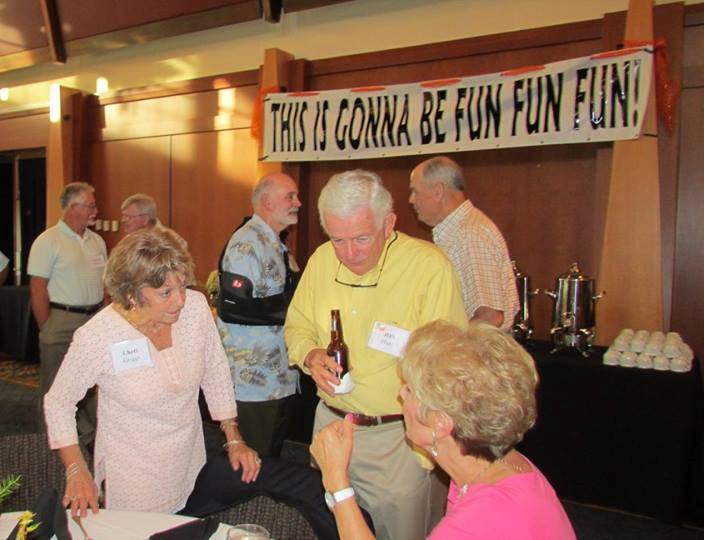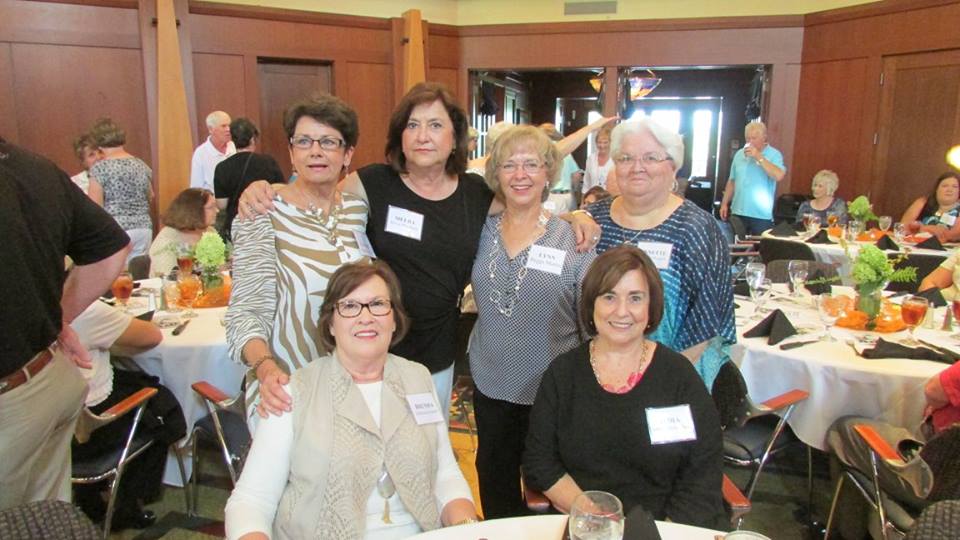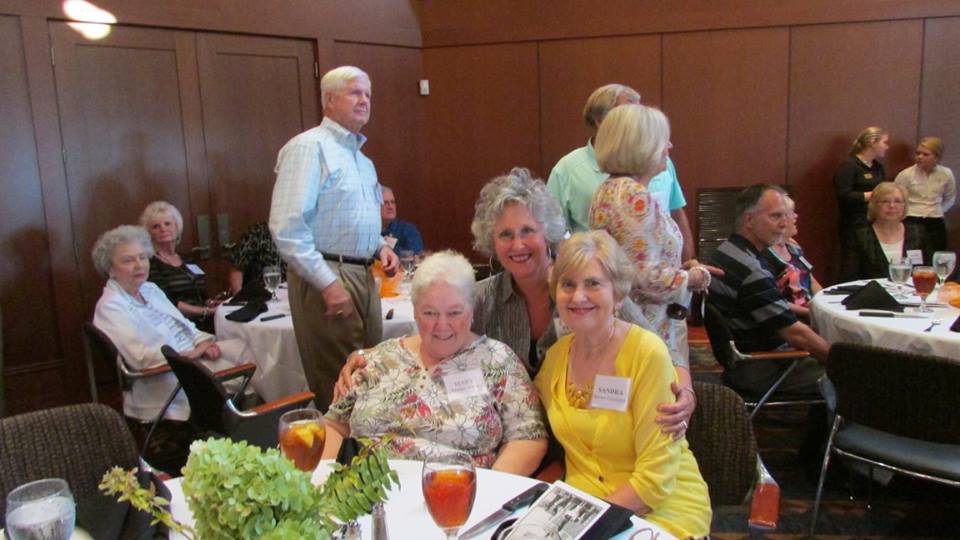
Five years
ago, the Ol' Bloviator crammed this little cranny of cyberspace with a
semi-weepy, self-indulgently sentimental account of the forty-fifth reunion of
the Hart County (Ga.) Class of 1965. Guess what? He's back to do the same for
our fiftieth reunion gathering. (Pause here for hardened cynics and assorted
misanthropes to just click themselves somewhere else, for the O.B.is about to step
way out of character here and go into full Sunshine Pumper mode. The 2010 entry
proclaimed "It's Hard to Be Humble When You're A Member of the Class of 1965," and you may rest assured that the report on
this weekend's proceedings stands merely to reaffirm that already indisputable
truth.
Let's start with a few numbers. The
post-World War II "baby boom" was just hitting its stride when the birth rate
reached a new high of 3.7 million in 1947, and the 204 of those who got their
diplomas from Hart County High on May 28, 1965, comprised by far the largest
class in the school's history. An interesting and perhaps not totally
irrelevant side note here is that our class boasted six sets of twins, which, by
the O.B.'s tortured and frequently suspect figuring, means that the incidence
of twin births in our bunch was more than three times the national average for
1947. At the very least, this would imply that although the war might have been
over, our Poppas didn't come home shootin' no blanks, and our sweet, angelic Mommas
were, well... ...let's just say, very happy to see them. Of our
original 204, to the best of anyone's knowledge, 160 of us are still alive--if
not necessarily always kicking. Now get this! Fifty years after we graduated,
107 of the surviving 160--that would be two-thirds of those of us blessed to
still show a pulse--showed up for a weekend when, for a few hours at least, a half-century's
worth of divergent experiences, lifestyles, and geographic locations simply
melted away. Suddenly, we were back cuttin' the town of Hartwell, which sure
seemed a lot bigger back then, in a long
oval sweep anchored by the Dairy Queen at one end and the "Chick 'n Burger" at
the other, resurrecting images of Dwight and Joe's muscle cars and Kathy's
T-bird (not much said about the O.B.'s 1949 Ford coupe, however) recalling once
red-hot romances and wondering if they were completely cooled even now. The
best test of true friendships may well be the capacity, after years of being
apart, to pick up with each other just where you left off five, ten or twenty, even fifty years ago.
Such caring and enduring friendships may be rare out there among you pitiable
souls in the general population, but the
O.B.'s observations of this and all reunions past suggests they are by no means
exceptional among his beloved class of '65ers. By way of illustration, let him
resurrect this little edited snippet from his 2010 exaltation of his classmates:
The
most recently deceased of our thirty classmates lost his leg in Vietnam and sometimes
lost his way thereafter. When he suddenly fell terribly ill a few months ago,
his country offered him no recompense for his sacrifice. Even as he lay ravaged
and dying with cancer, the VA hospital would not accept him as a patient, and
the Veterans Administration accepted no responsibility even for providing him
with a decent place to die. At that point, two of his former classmates, both
also fellow vets, stepped forward with the kind of compassion and character
that made me doubly proud to be a member of the HCHS Class of 1965 and made
arrangements to get our stricken comrade into hospice care.
He lasted only a
few days there, but when the VA declined to reimburse them, the hospice folks
were out some $5,100 in expenses. Determined not to see the matter end this
way, one of the 1965ers who had gotten him into the hospice unit called on the
rest of us via the listserv for the upcoming reunion to see to it that one of
our own who had been so ill-served by the country he had defended so
courageously should not have his passing recorded in red ink. Within a few
weeks, contributions to the hospice in honor of our classmate exceeded the
expenses for his care by roughly $2,000.
I'm sure some
weighed in more heavily than others on this, but I know for a fact that a chunk
of it came from folks who ain't exactly lighting cigars with $20 bills. I
wouldn't argue if you told me that members of other groups would
step up like this to honor the memory of someone they knew forty-five years ago
and hadn't seen much, if at all, since, but that doesn't mean I believed you.
This year the class cause was not
so urgent or tragic but there was the matter of paying for a huge dinner and
soiree done up properly for nearly 200 people, plus a magnificent four-color
directory complete not only with individual bios, but "then" and "now" photos of classmates, their children,
etc. Even with hard-bargaining and realistic expectations for what proved to be
a truly excellent repast, the bottom-line cost per classmate including the
dinner and directory raised concerns that some folks on fixed and not
particularly large incomes might be discouraged from taking part. Need a little
extra cash to try to prevent that? No problem. Just let fifteen or so folks
know, and as the French like to say, "VIOLA!"--the treasury is suddenly nearly
$7,000 to the good, and not only are cost overruns on the meal covered, but
regardless of whether they made it to the reunion or not, every classmate is
getting a class directory free of charge.
Surely, one of the as yet least
explored generational demarcations in recent American history is the end of the
military draft in January 1973. That much is obvious in constructing a
collective biography of our 1965ers whose lives and those of their loved ones
were affected so profoundly and in so many ways, either by actual military
service or by the looming uncertainty about it. Of our number, some 34 served
in Vietnam, where two of them, Bobby and Sammy, lost their lives. Both were
quiet country boys all through high school, and while information about Sammy's
death is sketchy, we know a little more about Bobby's story, thanks to Charlie,
who had been wounded in Vietnam himself. Bobby arrived in Vietnam in October 1967 and
his tour was scheduled to end the following September. Hence, he and his
sweetheart, who had decided to hold off on marriage until he came home, settled
on "See You in September" as their song. Though he was often in the thick of
the fighting, Bobby had survived for seven months, only to lose his life on May
13, 1968, after exposing himself to NVA fire by rising to defend his crewmates
with an M-16 after the turret gun on his Armored Personnel Carrier jammed.
Bobby, Sammy and Charlie were but three of thirty-four class members who served
in Vietnam, accounting among them for a Bronze Star and nine Purple Hearts. As
he has reported elsewhere, the closest the O.B. ever came to the latter was a "Purple
Buttock" resulting from a spider bite suffered one night in the woods when his National
Guard unit was called up during a flood, and he salutes his gallant classmates
for their immense courage and great sacrifices.
To be sure, these men are bona fide
heroes every one, but they were by no means the only courageous people in this
remarkable group whose members have withstood the deaths of spouses and
children, beaten back cancer (more than once in several cases) and other life-threatening
diseases and conditions, and refused to yield self-pity or despair despite all
manner of additional adversities. Yet there was Mary, sprung from the assisted
living facility where she has been for several years, in her wheel chair but
bright-eyed and perky and clearly thrilled to see her old friends. There was
also Brenda, who got out of bed just a few days after major surgery for a critical,
extremely painful condition to make the reunion scene with her
husband/classmate, Tony. Not the least
of the class stalwarts is the O.B.'s old and dear friend Bill, who was
diagnosed with Type I diabetes in childhood, and by his own account, as one of
the less than 1/10 of 1 percent of those who contract this disease in childhood
and live with it more than fifty years, he now ranks as a certified "a freak of
nature." Just to make it interesting, by the way, Bill also survived a
devastating heart attack along the way. His diabetes guaranteed a "4-F" Selective
Service classification, but he claims that it also left him fending off a crowd
of friends looking to score a cup of his pee for their own draft physicals. A
very successful financial adviser, Bill has now bought a bike and vows to join
a motorcycle gang. All the O.B. can say to that is "Heads Up, Hell's Angels!
Here comes Bill!"
Those of you who have had about all
the gushing you can handle by now might ask if the O.B. is asking you to
believe that his high school class was something akin to God's special little
project, a peculiar assemblage of talent, virtue, strength, and compassion,
designed to show skeptics what he could do if he really tried. Much as he'd
like to affirm this with a simple "you're durn tootin'!'" and be done with it, he
has to concede that his 204 best buds were also a product of their time and
place. The members of the largest class in the history of our high school had
also been members of the largest classes ever in their respective grammar
schools, meaning that they probably heard throughout grade school about being a
"special" group, of whom much would be expected. Beyond that, as part of the
initial surge of "boomers," our ranks boasted an uncommonly high percentage of
first-borns who generally manifest higher expectations and a greater fixation
on achievement than their younger siblings. Some of this may be a reflection of
the additional time they spend with their parents before those siblings come
along, which probably means closer parenting of first-borns, but one thing's
for sure, our Moms and Dads focused on keeping us from doing bad things, not
hovering overhead in their private choppers ready to swoop down and make
excuses for us when we did. Our folks were, by and large, the mainstays of Tom
Brokaw's "Greatest Generation" who had not only won the war but lived through
the Great Depression. Although they strove
to keep us safe from want, they also understood that nothing was guaranteed in
life, and for all our quasi-rebellious dalliances with the likes of Elvis, and
later the Beatles and the Rolling Stones, most of us still absorbed enough of
that wisdom to know that getting the best education and jobs we could was the greatest
hedge against uncertainty available to us. Fortunately, we came of age at a
time when post-secondary educational opportunities were expanding as were new
and better jobs.
More fortunately still, we Hart
County kids had been blessed to have a truly extraordinary group of teachers,
most of them in and of the community and practically all of them truly dedicated
to preparing and challenging us. In fact, the O.B. was so dadburned challenged
that he barely sneaked in near the bottom of the top 10 percent of his class. Like the athletic accomplishments that were unprecedented
in school history, our class's impressive achievements in state and even
national debate and literary competitions against much larger and better-funded
schools were every bit as much a testament to the hard work and dedication of
our teachers, as to the talent of the students who lugged the trophies home.
The Class of '65 suffered from no shortage of brains or pulchritude.

More evidence of the above with this trio of the O.B's First Grade Crushes
None of all this is to say that
every one of us presents the classic Horatio Alger story. Violence, drugs,
alcoholism, and other forms of self-destructive behavior are not unknown within
our ranks, and gut-wrenching tragedy and abject misfortune have not exactly been
strangers either. Yet for all that, what the O.B. saw last weekend was a group
of people focused not on their trials and setbacks but on their blessings, not
the least of them being all the people who were smothering them with kisses,
hugs, and handshakes that often were really wannabe hugs. The O.B. doesn't give
a toot whether sociologists, demographers and other assorted know-it-alls would
agree that his group seems all that exceptional statistically. Flesh and blood trumps numbers and theory
every time, and he knows for sure that being part of what is actually a very
special extended family for him is not simply one of the most precious of his
own many blessings but, at its heart, a far more vital source of pride and inspiration
than any accolade that has or ever will come his way.
(All Photos by Annette Majeski Rogers)